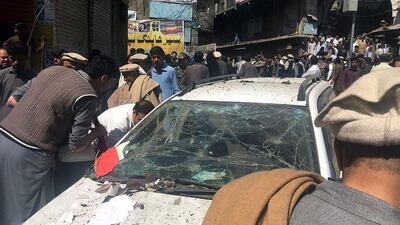Peshawar, Pakistan // Twenty-two people were killed and 57 wounded on Friday when a car bomb exploded in a market in a mainly Shiite area of Pakistan’s tribal belt, in an attack claimed by the Taliban.
Survivors described hiding inside shops after the blast, as bystanders rushed to help the wounded inside the busy market in Parachinar, capital of Kurram tribal district.
Authorities fear the number of dead will rise.
The attack came after a wave of militant violence killed 130 people across Pakistan in February, unnerving citizens who had been emboldened by improving security and prompting a military crackdown.
“People were screaming for help. When I looked back everything was filled with dust,” said Sardar Hussain, a shopkeeper.
He saw his father “drenched in blood and dust”, while two of their customers were dead on the floor.
“We closed doors of the shop as we thought there might be a second blast, but we heard gunshots for a while and people were shouting, so we got out,” said Muhammad Ali, a Parachinar resident who was in another shop.
They emerged to a scene of desperation, Mr Ali said, with bystanders carrying the wounded to hospital in any vehicle they could find as security forces arrived.
“We have 22 dead bodies here at the hospital and 57 injured, including women and children,” said Moeen Begum, a surgeon at a local government-run hospital.
Shahid Ali Khan, an administration official, confirmed the blast was a car bomb.
Prime minister Nawaz Sharif condemned the attack, said there was a duty to seek the “complete annihilation” of terrorism in Pakistan, and ordered assistance for local authorities.
Shiite leaders and residents quickly accused security forces of failure, with small protests in Parachinar.
Mr Ali and another witness said security forces fired at the protesters, injuring some.
“Terrorists crossing dozens of checkposts and carrying out attacks puts a question mark over the progress of security institutions,” said Allama Raja Nasir Abbas, chief of a Shiite political organisation in Islamabad.
Jamaat ul Ahrar, a faction of the umbrella Tehreek-e-Taliban Pakistan, or Pakistani Taliban, claimed the bombing.
The group took part of the wave of attacks in February, claiming responsibility for a suicide bomb in Lahore which killed 14 people.
February’s assaults also included a suicide blast at a Sufi shrine in Sindh province which killed 90 people and was claimed by ISIL.
The wave of violence dented optimism after the country appeared to be making strong gains in its decade-and-a-half long war on militancy, with analysts speaking of a militant resurgence.
Pakistan’s powerful army temporarily closed the border with Afghanistan, a country accused of harbouring the militants behind the attacks.
Politicians also voted to extend legislation creating secret military courts to try civilians on terrorist charges. The law had expired in January, with the controversial tribunals having hanged 12 people and ordered the executions of 149 more since 2015.
Human rights activists criticised the move, calling it part of a “seriously flawed counter-terrorism strategy”.
Parachinar was the site of the first major militant attack in Pakistan this year, a bombing at a different market which killed 24 people in January and was also claimed by the Pakistani Taliban.
Kurram is one of Pakistan’s seven semi-autonomous tribal districts which are governed according to local laws and customs.
The district is known for sectarian clashes between Sunnis and Shiites, who make up roughly 20 per cent of Pakistan’s population of 200 million.
* Agence France-Presse

